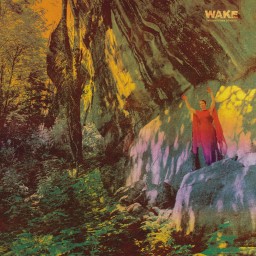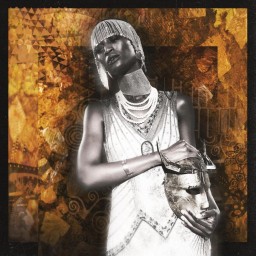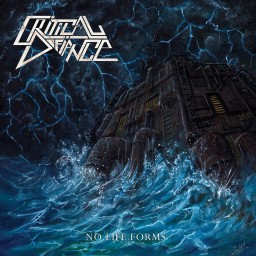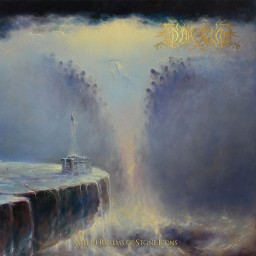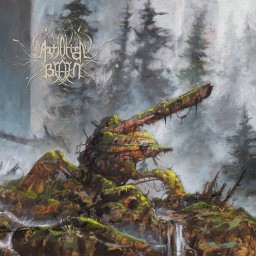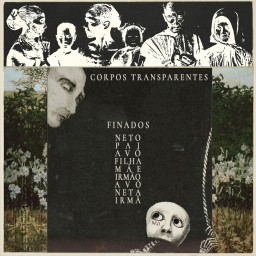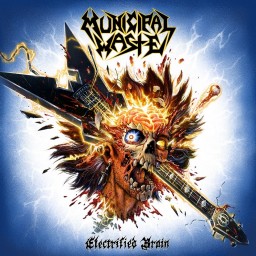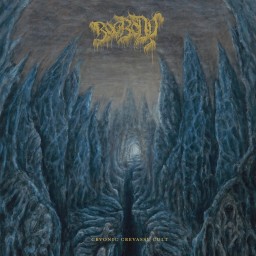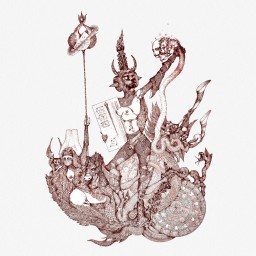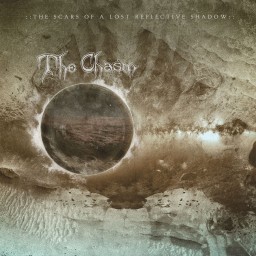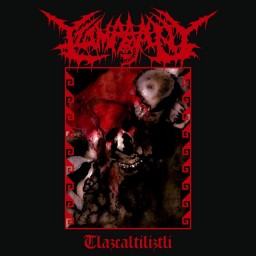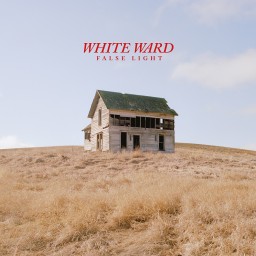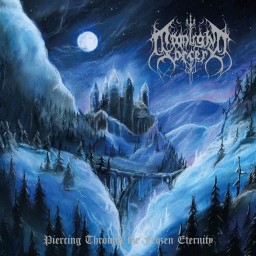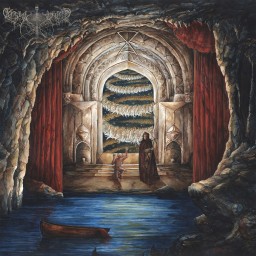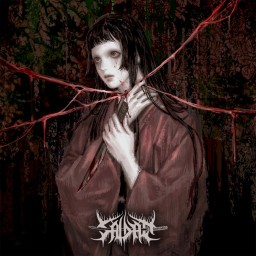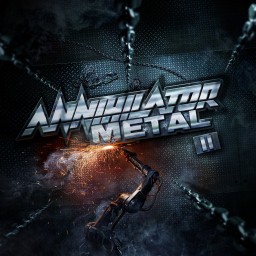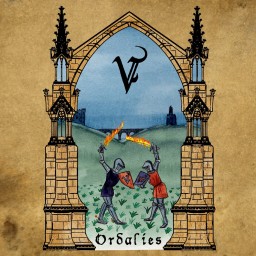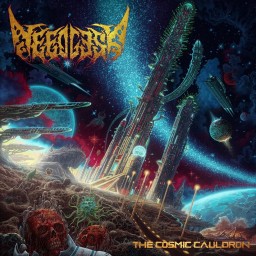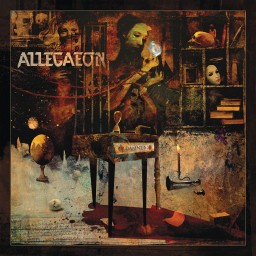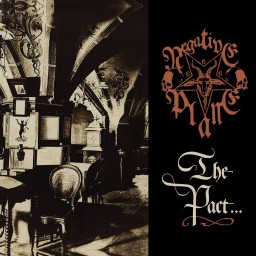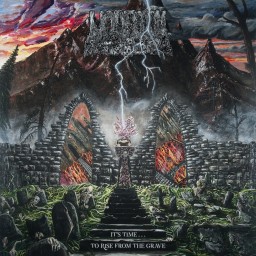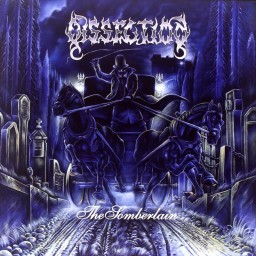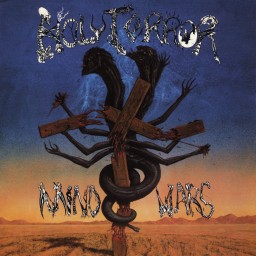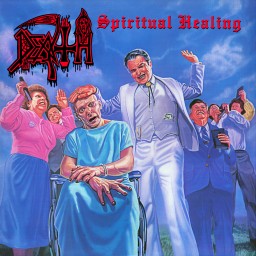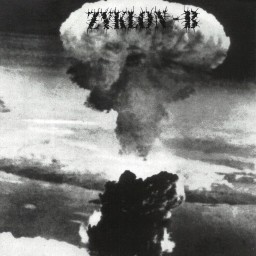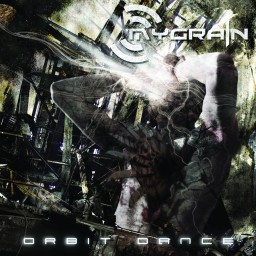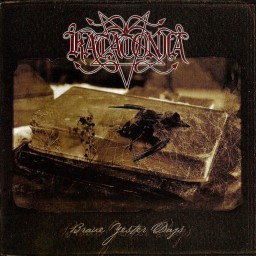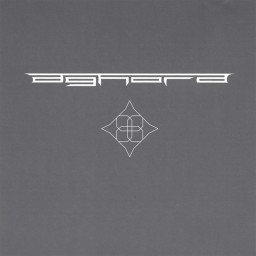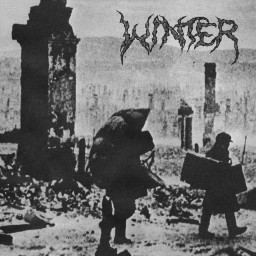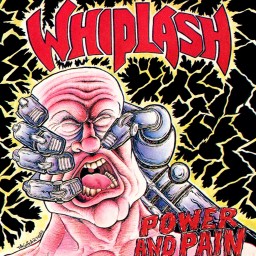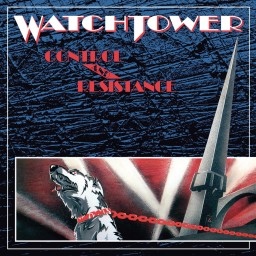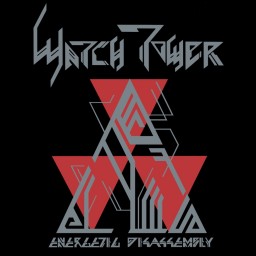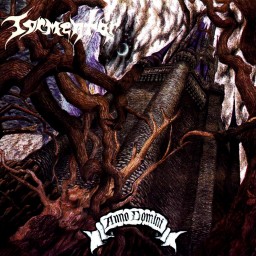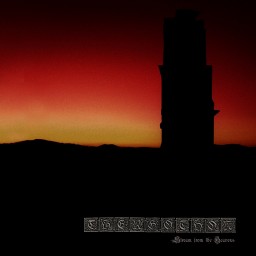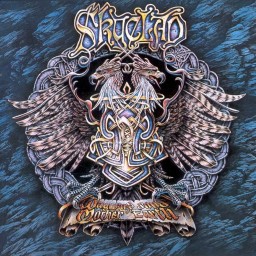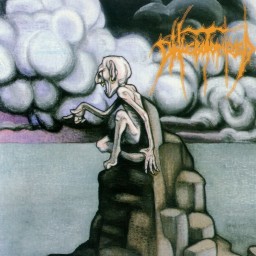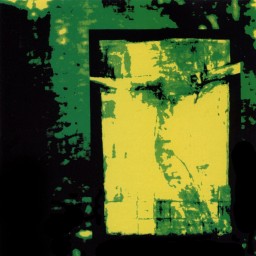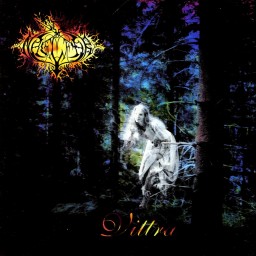Ben's Reviews
Apparently this Canadian band performed grindcore before switching to black metal in recent years. There's certainly an intensity to Thought Form Descent that's suggestive of their background, with roaring vocals and heavy blast beats being major features. Unlike the short burst songwriting of grindcore though, Wake have crafted lengthy, shifting black metal works for this release. It's taken me a while to really appreciate what they're doing, mostly because the guitars are lower in the mix than would be ideal, but I can't deny that this is a solid, impactful album. Bleeding Eyes of the Watcher, the track I included on the recent North playlist, is particularly great, pushing this from a 3.5 to a 4 for me. I'd like to hear more riffs on future releases though, as they're good when they're not hidden behind the onslaught.
2022 RANKING (62 releases so far)
24. Mammoth Weed Wizard Bastard - The Harvest - 4 stars
25. Wake - Through Form Descent - 4 stars
26. Bríi - Corpos transparentes - 4 stars
2022 BLACK RANKING (28 releases so far)
9. Wiegedood - There's Always Blood at the End of the Road - 4 stars
10. Wake - Through Form Descent - 4 stars
11. Bríi - Corpos transparentes - 4 stars
Genres: Black Metal
Format: Album
Year: 2022
I try to remain open minded when it comes to my metal. If my recent experience with White Ward proved anything to me, it was that I shouldn't accept my initial response to an album as gospel. I thought I was going to hate that album after a single attempt, but after numerous listens, I now consider it be a great release. To say that my first Imperial Triumphant attempt was disconcerting is understating things. Spirit of Ecstasy is an abrasive and chaotic experience, and an album that truly earns the Avant-Garde Metal genre tag. It's like someone threw dissonant death metal, avant-garde jazz and a whole bunch of effects and noise into a blender and turned it up to the max, or so it seemed on first listen. Given the huge praise the release is getting, I committed myself to coming to grips with it as much as I could before deciding how I really feel about it. What's the result? Well, I definitely now have a large amount of appreciation for what these guys have achieved. Many sections of the album are downright brilliant, and the musicianship to pull something like this off is obviously of the highest order. Tracks like Chump Change and Merkurius Gilded have opened up to me quite a lot, to the point where I like a lot more of their running time than I don't. But therein lies the problem for me. There is so much going here, that every track has parts that are, if not entirely unlistenable, just not very entertaining for me beyond novelty. I don't like jazz at all, and it's not going to make it sound better to me if it's performed in an abrasive fashion, or combined with screams and intense percussion. For every moment on this album that I dig, there's another that is just too much. Perhaps others just have a much greater tolerance for chaos than I do.
2022 RANKING (61 releases so far)
47. Negative Plane - The Pact... - 3 stars
48. Imperial Triumphant - Spirit of Ecstasy - 3 stars
49. Kreator - Hate über Alles - 3 stars
2022 DEATH RANKING (15 releases so far)
13. Undeath - It's Time... to Rise From the Grave - 3.5 stars
14. Imperial Triumphant - Spirit of Ecstasy - 3 stars
15. Needless - The Cosmic Cauldron - 3 stars
Genres: Avant-Garde Metal Death Metal
Format: Album
Year: 2022
I think I've just been bitch-slapped by the gods of metal! There I was just a couple of weeks ago wondering whether I'd lost my love for thrash metal. Album after album has been disappointing in recent times to the point where I was left considering whether I was the problem. Thank fuck Critical Defiance came along to set me straight. This is how I like my thrash metal! This Chilean band have followed in the footsteps of some of the more intense 80s and early 90s thrash band, such as Sadus and Morbid Saint. There are riffs flying all over the place, and I can't tell you how happy I am that the production puts them right up front and in your face. Thrash metal has always been about the riffs, and Critical Defiance have given them the love and attention they deserve. The vocalist spits vocals out quite rabidly at times, yet balances that aggression with more controlled rhythms as well, creating an exciting yet palatable level of energy throughout. That said, the awesome mid-album instrumental (the somewhat paradoxically named Elephant) is probably the highlight for me, because it really lets the listener focus in on the band's strength (again, riffs).
The only real flaw here is that the band don't always make the most of all the goodies. While I do appreciate the 29 minute running time, some of the 10 tracks could have been given a bit more time to shine. Many of the best riffs come and go all too quickly, never returning until the listener inevitably presses play again. But I guess I can't have my cake and eat it too. No Life Forms is an exciting thrash metal release, crafted to get your blood pumping and certainly taking no prisoners. Song-writing takes a backseat to keeping the adrenaline going, and who am I to complain. This was the kick up the ass I needed!
2022 RANKING (59 releases so far)
20. Deathspell Omega - The Long Defeat - 4 stars
21. Critical Defiance - No Life Forms - 4 stars
22. Wiegedood - There's Always Blood at the End of the Road - 4 stars
2022 THRASH RANKING (11 releases so far)
1. Critical Defiance - No Life Forms - 4 stars
2. Schizophrenia - Recollections of the Insane - 4 stars
3. Nocturnal Graves - An Outlaw's Stand - 3.5 stars
Genres: Thrash Metal
Format: Album
Year: 2022
I'll say straight off that this is an extremely classy and impressive debut album. The level of sophistication and musical sorcery on offer is pushing the top of the scale, and I have very little doubt that Tómarúm could become very big indeed! Very much a black metal album, and a fairly intense one at that, Ash in Realms of Stone Icons enters progressive territory through the use of complex structures, gorgeous leads and a snaking fretless bass that makes its presence known throughout. I have no doubt that fans of bands like Ne Obliviscaris will drool over the result, even if it is more on the extreme side. Despite everything I've said so far being apparent from my first listen, I've spent the last week and a bit trying to figure out just how much I personally enjoy it. Being an obsessive black metal fan, I've actually found some of the progressive aspects to be a bit of a distraction, particularly the bass, which constantly jumps out of the mix in ways that feel a bit unnecessary. Some of the tracks are also a bit longer than they need to be, making listening to the hour long runtime a bit of a daunting prospect. As the album has grown on me, these concerns have lessened, and I'm now very comfortable giving this exciting and at times quite breath-taking debut release 4 stars. I can't wait to hear where Tómarúm go from here!
2022 RANKING (58 releases so far)
15. Tzompantli - Tlazcaltiliztli - 4 stars
16. Tómarúm - Ash in Realms of Stone Icons - 4 stars
17. Druid Lord - Relics of the Dead - 4 stars
2022 BLACK RANKING (27 releases so far)
6. Celeste - Assassine(s) - 4 stars
7. Tómarúm - Ash in Realms of Stone Icons - 4 stars
8. Deathspell Omega - The Long Defeat - 4 stars
Genres: Black Metal Progressive Metal
Format: Album
Year: 2022
Over the past few months I've really started to regret spending the last decade being so fixated on 90s/00s death metal. For some reason I'd formed the opinion that a lot of modern death metal was too clinical and over-produced for my tastes. It turns out I was either completely wrong, or things have improved in recent years to the point where 2022 is seeming like a very good year indeed for the genre. Artificial Brain's self-titled third album is yet another excellent death metal release for the year, following up albums from Immolation, Pharmacist, Hath and Cosmic Putrefaction, amongst others. I must admit that I was initially a bit put off by the pig-squeal style of the main vocalist, but I've surprisingly come to enjoy them quite a bit. It also helps that there's some variation in vocal style across the album, which I'm assuming is due to three band members having vocals next to their name in the sleeve. Vocals aside, the music and production on this release are outstanding! Apart from the occasional use of that truly awful echoing garbage can lid sound that slam death bands have a tendency to use, all the instruments sound fantastic. Everything, including the bass, is giving room to breathe, which is admirable given just how intense this album is.
There's an excellent balance between brutality and memorability, technicality and cohesiveness, throughout this album. If you're even slightly into the more extreme side of metal music, this is band that should be on your playlist. I haven't yet checked out their earlier work, but I certainly will after this. As far as death metal goes this year, only the mighty Immolation's latest effort surpasses what Artificial Brain have achieved here. If you want a taste, check out any of the first four tracks, although I think Celestial Cyst is the highlight, as painful as that sounds.
2022 RANKING (57 releases so far)
4. Mournful Congregation - The Exuviae of Gods - Part 1 - 4.5 stars
5. Artificial Brain - Artificial Brain - 4.5 stars
6. Mizmor & Thou - Myopia - 4.5 stars
2022 DEATH RANKING (13 releases so far)
1. Immolation - Acts of God - 4.5 stars
2. Artificial Brain - Artificial Brain - 4.5 stars
3. Pharmacist - Flourishing Extremities on Unspoiled Mental Grounds - 4.5 stars
Genres: Death Metal
Format: Album
Year: 2022
This album has me considering what actually constitutes a black metal album. Should an album be considered black metal if it contains no black metal riffs at all? Bríi is yet another highly adventurous artist that mixes outside influences, in this case breakbeat / drum and bass and a whole heap of jazzy piano and synths, with aspects of metal (blasting and black metal vocals). The result is unlike anything I've ever heard, and I wouldn't be surprised if it has a fair portion of metal fans running for the hills. Personally I've found Corpos transparentes, which is a single 36 minute movement, to be thoroughly entertaining, and I delight in the sheer creativity on offer. Perhaps my general fondness for electronic music, particularly IDM, Breakbeat and Trip Hop, means that the individual ingredients that make up this album are all in my wheelhouse. The fact that I've never heard them all merged together as they are here makes this more curiosity than challenge.
I've listened to this release every day in the past week and I'll definitely be returning to it in the future. Every listen reveals more little aspects I hadn't noticed previously, but unlike some of the dense releases I've reviewed recently (such as Epitaphe's II), this is an album that doesn't require a heap of listens to come to grips with. I think you'll already know whether or not your metal palate will accept or reject an album like this. If you feel like it could be the former for you, I highly recommend giving this a try.
2022 RANKING (55 releases so far)
20. Mammoth Weed Wizard Bastard - The Harvest - 4 stars
21. Bríi - Corpos transparentes - 4 stars
22. Aeviterne - The Ailing Facade - 4 stars
2022 BLACK RANKING (26 releases so far)
8. Wiegedood - There's Always Blood at the End of the Road - 4 stars
9. Bríi - Corpos transparentes - 4 stars
10. Krallice - Crystalline Exhaustion - 4 stars
Genres: Avant-Garde Metal Black Metal
Format: Album
Year: 2022
I've not spent much time with Municipal Waste over the years, as I'm generally not a fan of crossover thrash. That said, I thought I'd give this album a try when I saw it has a thrash metal primary. I have no regrets! In fact, there's more traditional thrash metal than crossover thrash on Electrified Brain, and I've discovered much more to my liking than I would have expected. After being quite negative about recent thrash metal releases (Destruction, Kreator, Deathhammer etc.), it's so damn refreshing to hear so many great riffs on offer. The moment that second track Demoralizer pumped out of my speakers, I knew that my love of the genre was finally getting an invigorating kick up the ass! There are plenty more highlights too, with Last Crawl, Grave Dive, High Speed Steel, Thermonuclear Protection and Restless and Wicked all scratching an inch that had been increasing in intensity over the past 6 months.
So why only 3.5 stars? Well, while the pure thrash metal moments are consistently entertaining, there are a number of aspects on the album that are just a little bit challenging for me. There are a heap of gang vocals, which I've never been a fan of, and the second half of the album in particular has a few sub-two minute skater thrash tracks that don't really work for me. I'll certainly take the good with the bad though and, if nothing else, this album has reminded me why I belong to The Pit. Perhaps there could be great modern thrash metal release waiting for me around the corner?
2022 RANKING (54 releases so far)
31. Moonlight Sorcery - Piercing Through the Frozen Eternity - 3.5 stars
32. Municipal Waste - Electrified Brain - 3.5 stars
33. Konvent - Call Down the Sun - 3.5 stars
2022 THRASH RANKING (10 releases so far)
2. Nocturnal Graves - An Outlaw's Stand - 3.5 stars
3. Municipal Waste - Electrified Brain - 3.5 stars
4. Dream Widow - Dream Widow - 3.5 stars
Genres: Thrash Metal
Format: Album
Year: 2022
Whenever I see a new Death Doom Metal album to listen to, I generally get quite excited. It hasn't been an amazing year for the subgenre so far. There have been a few strong offerings, particularly from Druid Lord, Tzompantli and Epitaphe, but at this point it feels like I might be scraping the bottom of the barrel to produce any sort of top 10 Death Doom releases at the end of the year. I was therefore eager to get into this Body Body release. That eagerness quickly turned to bewilderment though, as I soon realised that this release has zero guitar riffs. You read that correctly! There are no guitars on this doom album, with the two band members playing drums and bass respectively, while sharing vocal duties. Once I got passed this initial surprise, I decided to make a big effort with Cryonic Crevasse Cult, putting aside my doubts and giving the album every chance to impress me. Sadly, it hasn't.
With no traditional riffs, the bass definitely holds a much more important position than on most doom albums, which is why the fuzzy and somewhat distant production the instrument gets is so strange. The vocals are also weak, leaving it up to the drums to really hold my attention. They're mildly enjoyable, but the overall result is weak and, it has to be said, just boring. I can't help wondering why a label would pick up a band / album like this. It's certainly not terrible, but it does sound like a demo from two mates laying down some tracks in the hope of attracting a guitar player. I recommend avoiding this one.
2022 RANKING (53 releases so far)
51. Mnima - Disciples of Excremental Liturgies - 2 stars
52. Bog Body - Cryonic Crevasse Cult - 2 stars
53. Owls Woods Graves - Secret Spies of the Horned Patrician - 2 stars
2022 DOOM RANKING (14 releases so far)
12. Hangman's Chair - A Longer - 3.5 stars
13. Mizmor - Wit's End - 2.5 stars
14. Bog Body - Cryonic Crevasse Cult - 2 stars
Genres: Doom Metal
Format: Album
Year: 2022
This is my first Esoctrilihum experience, so I can't compare it to the band's previous works. Apparently it's a one-man band though, with all instruments performed by someone going by the name of Asthâghul. That one person can create such a cacophony of sound is impressive to say the least, although it's worth noting that there's heavy use of a drum machine. It's a very organic sounding drum machine, but the speed and precision and pure joyful destructiveness are surely beyond human capabilities. On first listen of Consecration of the Spiritüs Flesh, it's difficult to hear much beyond intense blasting beats and demonic shrieks and roars, with the riffs and symphonic soundscapes working their way through on subsequent listens. It's for this reason that I've given the album many a spin in the hope that each of the seven tracks would worm their way into my subconsciousness, allowing me to enjoy everything it has to offer. I'm delighted to say that, for the most part, that's exactly what's happened. There are a lot of subtle additions that I find myself enjoying and looking forward to, most of which were not initially apparent. There are a couple of tracks (particularly third track Shohih) which haven't quite evolved far beyond the highly impenetrable and monotonous blasting ceremony that they appeared to be on first listen, but I now consider the album overall to be very enjoyable.
I do feel this release would have had a better flow if one of the final two tracks, which have more variation in speed and style, were moved up the tracklisting, but perhaps it was the intention of Asthâghul to beat the listener into submission before releasing the pressure and allowing them to ease their way out of the experience intact (note: the final two tracks are still intense). Anyone interested should check out opener Spiritüs Flesh and closer Aath to get a good idea of what this album has to offer. Personally I'm quite impressed, and keen to check out more Esoctrilihum releases. Recommended for anyone that enjoys intense bands like Anaal Nathrakh.
Genres: Black Metal Death Metal
Format: Album
Year: 2022
The Chasm are one of those bands that I've checked out many times, but have never been grabbed by their work the way the constant praise they receive suggests I should be. This latest offering seemed like a perfect opportunity to really dive into one of their releases and hopefully find the treasures that have been avoiding me to date. Sadly, that hasn't turned out to be the case. While this is a very solid album, with consistently decent riffs and a few 4 star tracks, it lacks anything particularly impressive that would explain the fandom. I reckon I've listened to the album about 10 times, and I still find it difficult to call anything a real highlight. The riffs are the obvious strength, and every track has at least one that makes you pay attention, but both the vocals and drums are generally lacking in power and effectiveness. Antonio León's drumming in particular can only be described as pedestrian, getting bogged down in a simple one - two beat for much of the album. If there had been more creativity and variety in that department, then some of these songs may have forced their way beyond mildly enjoyable and into the realm of must listen. As things are though, well, I'm still keen to hear more of what the band has to offer, but I can't say I'm particularly excited to keep The Scars of a Lost Reflective Shadow on my playlist.
Genres: Death Metal
Format: Album
Year: 2022
This is my first Kostnatění experience and it's certainly a unique one. Metal bands have been introducing traditional folk music from a whole variety of countries and cultures over the years, but rarely is it done with this much conviction. It's actually astounding that the main writer and performer (Dillon Lyons performs everything apart from drums) is actually from the United States, as he's managed to fill every nook and cranny of this EP with Turkish melodies and vocal stylings. The melodies are likely to be more familiar than you might think, if only due to the very distinctive sound and techniques involved. I had my doubts as to whether this type of music could be successfully integrated into Dillon's dissonant and chaotic form of black metal, and I have to say that I'm still not completely convinced. The drumming is surprisingly brutal, with blasts and fills flying in every direction, which can be a little jarring when it's accompanying slow to mid-paced traditional folk melodies. The production has a very live feel to it too, with everything seemingly purposefully left a little rough around the edges.
While I can totally appreciate this release for what it is, I have to admit that I struggle to see at as anything more than a novelty. It's neat to experience such an unusual amalgamation, but do I actually want to listen to it? Do I actually really enjoy it? I've had to admit that the answer is no. Definitely worth a listen, but not something I'll be going back to. As a final note, I find it strange that a release so overflowing with folk music has not a single vote for Folk Metal on RYM. The description for Folk Metal is "a fusion of metal with Traditional Folk Music" and it also suggests that "Folk Metal is often integrated with other subgenres such as Viking Metal, Black Metal, Symphonic Metal and Power Metal". Well, here we have a black metal release almost entirely made up of traditional Turkish folk music, yet somehow doesn't justify that description.
Genres: Black Metal
Format: EP
Year: 2022
Apparently Tzompantli (which is the name of a Mesoamerican skull rack) is the side project of Brian Ortiz, a member of the Metalcore turned Death Metal outfit Xibalba. I've never heard that band, so have no idea just how much of a departure this album is. I can say that Tlazcaltiliztli is a really intriguing album that caught my attention almost instantly. It combines tribal sections with a disEMBOWEMENT-like death doom, and adds a bunch of heavy, groovy death metal into the mix. One minute it sounds like Evoken performing some dark native ritual, while the next it brings to mind an ultra-doomy cover of Where the Slime Lives. The drumming is a highlight for me, always changing patterns and techniques while never losing touch with the riffs. I'm a sucker for tribal drumming in general and while I do wish that they were more entwined with the metal rather than playing a separate role, I welcome them every time they appear. This is yet another great Fallen release for 2022 (which wouldn't feel out of place in The Horde) and one I thoroughly recommend. It's relatively short running time make it easily consumable, so if it doesn't float your boat, you won't have lost out on much.
Genres: Death Metal Doom Metal
Format: Album
Year: 2022
If you'd told me I'd call the new White Ward album my favourite black metal release of 2022 so far (in July), I never would have believed you. While I hadn't heard them previously, their blackgaze tag and rather un-black metal album covers had made me assume that they were unlikely to be my thing. Well, in a year when Ukraine itself is fighting against the odds, this Ukrainian band has done the same, and completely floored me. First off though, I'm glad to see that RYM users have course-corrected in recent days, and replaced the blackgaze genre with atmospheric black metal, as there's nothing much resembling blackgaze here. That said, the 66 minutes of music found on False Light covers a whole range of styles, from dark jazz to post-metal to black metal, while also including some ambient sections with apparent lecture-recordings covering climate and religion. The saxophone isn't a gimmick either. It's actually a dominant instrument on the album, not only coming in during interludes and instrumentals, but also merging into the black metal aspect fairly regularly. There are a few different vocalists used as well, so I'm literally amazed at just how well this album integrates all these sounds together, when it could have felt completely disjointed. It never feels jarring, with the lengthy tracks flowing neatly through a whole variety of compelling sounds while still managing to form their own identites.
I'm sure that False Light isn't going to be for everyone. It's quite a daring release, and I had to fight off some initial bouts of uncertainty before developing what is now a very strong affection for it. The only thing stopping me from giving it the full five stars is second track Salt Paradise, which hasn't won me over. The deep monotone voice of Jay Gambit makes the tracks a pretty dour experience, without any of the moving sections found throughout the rest of the album. Don't let that criticism stop you from giving this album a chance though. It really is something pretty special!
Genres: Black Metal
Format: Album
Year: 2022
I have mixed feelings about this EP from Finnish band Moonlight Sorcery. On the one hand, they perform pretty great symphonic black metal, which is a subgenre I'm extremely fond of. When they focus on this aspect of their sound, I really enjoy what they're about, particularly the two more consistently black metal tracks, being Ice-Veiled Spell and closer Hauta-alttari (which I included in the North playlist a couple of months back). But Moonlight Sorcery aren't your typical Emperor clone, with heavy metal influences playing a significant role in their output. Not only are there a number of more traditional metal riffs that pop up here and there, there's also an unusually high focus on leads. The production is very suitable for these aspects, as it's a lot clearer and brighter than you might expect for black metal, but it does have an impact on the atmosphere that I would normally look for in a release like this. My adoration of the shrieking vocals and icy riffs is often disrupted by a classic metal riff, a guitar hero lead, or a My Little Pony-inspired twinkling symph effect, taking me out of the sacred black metal headspace.
If I sound a bit down on this EP, it's only because I can hear so much potential. A full length release in line with this EP's better moments could be damn awesome, but I fear that the band have set themselves on a path that's not 100% in line with where I personally would want them to go. I'll definitely give any future Moonlight Sorcery releases my full attention though.
Genres: Black Metal
Format: EP
Year: 2022
And so I find myself listening to yet another previously unknown death metal band, this time from Italy, and being utterly impressed. I'm actually becoming conscious of just many 4 star ratings I've dished out to death metal albums released this year, but as critical as I'm trying to be, the quality is too high to ignore. Cosmic Putrefaction have crafted a very professional album in Crepuscular Dirge for the Blessed Ones. There's a progressive edge to some of it, without being overly technical, as each track twists and turns in interesting ways. The band really know how to use blast beats in a satisfying way, not simply pummelling the listener with relentless ferocity. There's more of a hold and release technique going on, and with all the other little variations that enter the fray, I've rarely found myself struggling to remain engaged. As an example of this, synths are used tastefully and effectively, and yet only pop up a handful of times on the whole album. It's this restraint and creativity, along with the excellent performances and production, that leave me wanting to hear more from this band. If you're into the more traditional death metal, albeit with progressive leanings, I recommend checking this out.
Genres: Death Metal
Format: Album
Year: 2022
Calling this melodic black metal isn't incorrect, but nor does it tell the full story. There are actually a lot of other influences jumping in and out of Saidan's work, and I can't say that they're all working for me. The black metal aspect is quite decent for the most part, although much of it has a lightness to it that reminds me of a blackgaze influenced Cradle of Filth (cradlegaze?). Add to this the tendency for the band to throw in punk, folk and even a Slayer style thrash riff, and you've got an adventurous album that jumps wildly up and down my personal preference meter.
Genres: Black Metal
Format: Album
Year: 2022
I admit I had no idea that this was a re-recording of the band's 2007 album Metal until just now. You might think that the name, Metal II, might have given it away, but since I haven't heard the first one, I figured it was a sequel of sorts. Now that I know, I have to wonder why they bothered to re-record it. Maybe the production was shite the first time around? Perhaps Jeff Waters just thought it would be better with Slayer legend Dave Lombardo on drums and Stu Block from Iced Earth performing vocals?
Whatever the reason is, I went into this not having listened to anything the "band" has released since the mid-2000's. As a big fan of Annihilator's first couple of records, I stupidly hoped that there might be something here that resembles what made those early albums so entertaining. There are definitely moments on Metal II that showcase the thrash metal pedigree of the undeniably talented Waters. His guitar skills are still very much on show, but sadly so are his lazy song writing habits and shockingly bad lyrical abilities. Honestly, this guy writes some seriously cheesy shit! He also has a habit of injecting pointless, boring sections into otherwise decent tracks, as though he's trying to sabotage his own work. The track that comes closest to raising my late 80s thrash metal devil horns is definitely Clown Parade, but even that track contains a momentum-killing concert-intended singalong towards the end.
In the end, any chance I had of enjoying Metal II is ruined by the albums more atrocious efforts, such as the horribly cheesy Army of One, the hard rock dullness that is Romeo Delight, and the downright awful wannabe stadium-filling Detonation. It does seem as though I haven't missed anything by skipping the last 7 Annihilator albums.
Genres: Thrash Metal
Format: Album
Year: 2022
How do you assess an album that consistently breaks up otherwise excellent medieval flavoured melodic black metal with jolly sing-alongs and atmosphere-breaking folk melodies. This is the question I've been faced with after giving French band Véhémence's third full length album plenty of time to impress me. I genuinely dig the hugely majestic black metal that fills most of the release's hour long runtime. There are heaps of fantastic riffs on offer, and the musicianship is totally on point throughout. If the band gave me a whole album of more pure black metal, with riffs like those found in great tracks like Notre royaume... en cendres and Par le glaive, this would easily get 4 stars, threatening 4.5. As it is though, there are just too many of those awkward folkish change-ups that sound more like pirate shanties or dance-around-the-maypole jaunts than anything I want in my black metal.
These criticisms obvious come down to personal taste though, and I'll say straight out that this is a high quality release. If you're reading this and you like both majestic black metal and Ensiferum-style folk metal, then this could be your album of the year. As for me, well I'll still give this a listen from time to time, as it's a relatively small portion of the runtime that provokes my ire. There is still plenty of goodness here for this cranky old black metal fanatic.
Genres: Black Metal
Format: Album
Year: 2022
This release should be right up my alley. A melodic death album steeped in Warhammerish science fiction with imagery to match. Sadly, I've found the release to be more than a little challenging, for two reasons.
Firstly, the album chops and changes relentlessly, rarely ever giving otherwise decent sections room to thrive. Every time I hear something that really grabs me, the band move on within seconds, and often don't return. Needless live up to their name a bit, needlessly jumping from one riff to another, resulting in a fairly spasmodic outcome. If you're going to throw this many things at the wall, some of it is going to be shit, and the gold bits are likely going to be covered in it.
Secondly, speaking of spasmodic, Ádám Forczek's vocals are just as relentless and unstable. He roars, he screams, he sings, he growls, often all within the same lyrical line. It's hard enough to have memorable tracks when the music refuses to take the time to let the listener connect, but when you combine that with a completely rabid vocalist that won't shut up for a second, well... the whole thing becomes a bit of a chore.
It's a pity, because I can definitely hear an album in The Cosmic Cauldron that I would really enjoy. It's just infested with alien spores and an angry rabid space monkey. I think it says everything that my favourite track is the somewhat out of place female vocal led gothic metal ballad, that does a mighty fine Lacuna Coil impression.
Genres: Death Metal Thrash Metal
Format: Album
Year: 2022
This is my first Allegaeon experience and it's not quite what I expected. Given Damnum's single primary genre is Technical Death Metal, I expected something akin to Gorguts or Ulcerate. What I ended up with is a fairly technical and intense Melodic Death Metal album that occasionally drifts into Opeth territory. I'm not at all opposed to the melodic side of death metal, so I've found a lot to enjoy here. The production is great and the musicianship is very good indeed (the drumming and leads are particularly strong), plus there's a whole variety of utilised vocal techniques, including excellent (not to mention easily decipherable) deep growls, screams, Soilwork-like clean choruses and even more tender Åkerfeldt-ish singing.
The album is not without it's flaws though, with the 60 minute running time being the most obvious. While it's all consistently enjoyable, the album probably just overstays it's welcome, and most tracks fail to have that X factor that would take this release into higher echelons (which I feel like this band is capable of achieving). In the end I thoroughly enjoy what I'm hearing though, and hope to check out some of their other works. A very solid four stars from me.
Genres: Death Metal
Format: Album
Year: 2022
My first couple of listens to The Pact... were bewildering to say the least. It's unanimously considered a black metal album on RYM, and yet it certainly doesn't feel like one. I get loads of heavy metal vibes from it, regardless of what's technically going on. I think I spent the majority of my concentration during those first listens trying to figure out what I was listening to, instead of actually trying to enjoy what was on offer. A few listens later and I'm still not sure I've completely come to grips with it, but I feel ready to state that I don't really like it.
The album is certainly ambitious, with lengthy tracks filled to the brim with multitudes of riffs, and a storytelling element that isn't going to be everyone's cup of tea. I feel like I might be doing the album an injustice by not reading the lyrics and trying to figure out what the inspiration is, but I'm just not enjoying things enough to care. The musicianship on display is generally impressive, but it has to be said that the vocalist (who goes by the moniker Nameless Void) is going to be an obstacle to many listener's enjoyment, mine included. He has a very one dimensional approach, and given he can be heard the vast majority of the album's running time, that becomes a problem real quick!
The Pact... is one of those albums where there are a stack of differing sections to every track, but for me there are always one or two of them that have me gritting my teeth in discomfort. One minute I'm into it and starting to understand why the album is receiving high praise, while the next I'm getting ready to press the skip button and wondering what all the fuss is about. Despite these struggles, I do think metal fans should at least hear what Negative Plane have created. For everyone that doesn't get into it, there will be another that has it in their best of list at the end of the year. I'm genuinely interested to see what other Academy attendees think of it.
Genres: Black Metal
Format: Album
Year: 2022
I've mentioned a lot lately just how much I appreciate old school death metal. More specifically, that I feel like technology "improvements" and the expectation of adventurous creativity has resulted in bands often producing highly technical yet fairly soulless music. When I first pressed play on Undeath's new album, I thought my prayers (Satanic rituals?) had been answered. It doesn't get much more old school than this! I figured once these bread and butter beauties got their hooks into me, that I'd be praising this release to the hills, and immediately searching for their previous releases. Sadly, a bunch of listens later, I'm nowhere near as into this as I expected. There are definitely some great riffs, and plenty of time-changing fuckery to keep things interesting, but I just don't think the songwriting matches that of their inspirations (these guys are definitely fans of Morbid Angel and, in particular, Cannibal Corpse). It doesn't keep me excited and pumped the way a good death metal album should. That said, this is well produced and solid death metal that sounds like it came from my favourite era. The fact that I even considered giving it three stars should be a sign that this is just a bit underwhelming. I'll go back to my precious new Immolation album.
Genres: Death Metal
Format: Album
Year: 2022
Groundbreaking album that kicked off a subgenre while nailing it on the first attempt.
It wasn’t until late 1992 when the band began working on their debut album, that the infamous Dissection sound was fully formed. Due to problems coordinating all the guys from various locations, the entire band had shifted to Gothenburg, Sweden, where they shared a rehearsal space with the band At the Gates. I think it would be wrong to assume that this move to the home of melodic death metal, or the time spent with one of its establishing forces, were the catalysts for the melodic elements that entered Dissection’s sound around the same time. After all, while Dissection’s early work (The Grief Prophecy demo and Into Infinite Obscurity EP) were predominately straight forward death metal releases, they unquestionably had small touches of both the melody and the black metal that would eventually come to the fore in their sound. It’s more likely that Nödtveidt’s love of black metal and Zwetsloot’s background in classical guitar were the influences that drove Dissection to create something that, at the time anyway, was unique and groundbreaking. There’s no doubt that Nödtveidt was the main composer and lead guitarist for Dissection, but it was Zwetsloot that deserves credit for introducing the dual harmonies and the classical interludes that fill both of their classic albums, despite only taking part in the recording of The Somberlain.
Released in December 1993 and formally dedicated to the recently murdered Euronymous, The Somberlain stands as one of the more significant albums in the development of black metal. At this stage, melody wasn’t something often associated with the genre, and I’m not sure too many people in the scene considered it would ever play much of a role. Bands such as Darkthrone had taken the raw and nasty approach and others like Burzum had upped the atmosphere and melancholy to new heights, but The Somberlain showed that it was more than feasible to integrate melody without sacrificing any of the pure venom and majesty that the genre of black metal pretty much demands. Bands like Naglfar, Vinterland and Sacramentum owe their existence and success to The Somberlain, and its influence can also be heard in many of the melodic death metal albums that would shortly follow. The overriding atmosphere can be described as majestic and cold, with the razor sharp riffs combining perfectly with Nödtveidt’s raspy harsh vocals. This icy tone is beautifully captured visually by Kristian Wåhlin (aka Necrolord) with what is one his finest album cover efforts, giving more credence and mystery to the darkness contained within. The lyrics complete the package, describing shadowy lands and evil deeds, giving the listener numerous elements that form one distinct identity.
It has to be said though that despite how revolutionary and successful The Somberlain was on the first attempt, Dissection would substantially surpass it with the follow-up Storm of the Light’s Bane. There are two main reasons why I can’t rate the debut the full marks that its successor demands. Firstly, the three classical interludes by Zwetsloot are clearly meant to break the album up and give a bit of breathing space, but when focussed on individually are unnecessary and just a bit too pleasant to fit the tone of the surrounding malevolence. More importantly though, I don’t think Dissection had quite enough high quality material to keep the standard going for the whole 45 minutes. The first half contains sublime epics like Black Horizons, the title track and Heaven’s Damnation, but I think only Cold Winds of Nowhere comes close to matching them in the second half. Frozen has a fairly dodgy lead that threatens to ruin an otherwise decent track and The Grief Prophecy / Shadows Over a Lost Kingdom is a re-recording of old material that doesn’t quite compare to the new material. Flaws aside, The Somberlain deserves recognition for expanding the boundaries of black metal while being a thoroughly absorbing release in its own right. The recent two disc reissue by The End Records that includes the band’s demo and EP along with live and rehearsal material makes it an even more essential release.
Genres: Black Metal
Format: Album
Year: 1993
I initially struggled with this album. I think the main reason for that is the production. I don't know whether it's just my copy, but the sound is muddy and lacks the clarity that this album could really have done with. But I pushed on, as the music seemed decent. Well, Mind Wars has grown on me to the point where the production issues don't bother me too much. This is thrash / speed metal from LA, and these guys can certainly play. Every track contains ripping riffs and memorable song writing and there's a level of excitement and intensity throughout.
One of the reviewers below mentioned Iron Maiden, which may sound strange when we're discussing a rather up-tempo thrash album. But I can hear some galloping Maiden riffs in Holy Terror's music, even if they are played at twice the speed (check out The Immoral Wasteland for pure Maiden). I can also hear Sabbat (the thrash metal band, not the Japanese black metal outfit) on a couple of tracks, but then they released their albums around the same time as this, so can hardly be considered an influence. Thankfully, the vocalist for Holy Terror doesn't sound all that much like the massively overrated Walkyier from Sabbat. In fact, Holy Terror's Aaron Redbird is quite an amazing vocalist and his hardcore like rambling and high-pitched melodies take these already solid shred fests to great heights. Highlight tracks for me are Judas Reward, Debt of Pain and No Resurrection but this is a consistent album that I'm glad I checked out.
Genres: Thrash Metal
Format: Album
Year: 1988
Another step up in maturity for Death, Spiritual Healing is an underappreciated display of courage.
Given the band’s tumultuous history, it’s not surprising that the line-up between Leprosy and Spiritual Healing had changed. By the end of 1989, Chuck and second guitarist Rick Rozz were constantly in conflict, with the end result being that Rick was removed from the band. Chuck later stated the main reason this occurred was due to Rick’s unwillingness (or inability) to progress as a musician and given the band’s progressive ambitions, they needed to find a suitably talented replacement. James Murphy was that man. These days Murphy is a metal legend after being involved in albums by Obituary, Testament, Cancer and Disincarnate, not to mention several mostly instrumental albums released under his own name. His lead guitar work is brilliant and the ease at which he performs it highly admirable. At the time Chuck handpicked him to join Death, he was known only for his connection with thrash metal bands Agent Steel and Hallow’s Eve, yet had very little studio experience. That was all about to change though, as in the summer of 1989, Chuck, James, Terry Butler and Bill Andrews would enter the infamous Morrisound studio to record Spiritual Healing. It’s worth noting that this was also the first time Terry Butler had performed on a Death album, as Chuck performed bass on Leprosy despite Terry being listed as such on the album sleeve.
While these four musicians knew what their ultimate goal was at the time, it’s safe to say that many of the band’s fans did not. Death’s previous album Leprosy was a genre classic. It gave death metal an unprecedented brutality while still remaining entirely memorable and entertaining. All eyes were on Chuck to see what he’d unleash next with most fans expecting something even more brutal and shredding. Looking back, it’s not particularly surprising that a lot of these fans were a bit disappointed with the end result, but I believe this response had more to do with expectations rather than the quality of the material. Death chose to evolve away from the raw, vicious approach of their earlier albums and take on a more technical and mature style. The gory, violent lyrics were gone, replaced with social commentary regarding important issues such as abortion, religion and genetics. The ferocious, thrashy production of yesteryear was replaced with a clear Scott Burns driven, instrument focused sound this time round. Above all, the musicianship in general stepped up a level of technicality with exquisite leads and varied time signatures combining with the more standard death metal trappings. Chuck would expand on this over the next few releases of course, but Spiritual Healing deserves credit for getting the evolution well and truly off the ground.
It needs to be said though, that Spiritual Healing is not a flawless effort. As you would expect for a band trying to break new ground, not everything clicks the way it does on later albums such as Human, Individual Thought Patterns and Symbolic. For all the fantastic guitar work by Murphy and Schuldiner, drummer Bill Andrews is an obvious weak point. He does tinker with odd timings and there’s some nice double bass kicking, but in general his performance is simply too monotonous for an album with such a progressive attitude. Terry’s bass is adequate enough, but pales in comparison to the jaw dropping work of the session musicians Chuck would call on for future albums such as Steve DiGiorgio. Weaknesses aside, the song writing is totally compelling, with top riffs pumped out consistently throughout. Chuck’s vocals are powerful and venomous yet entirely decipherable which is perfect for the lyrical content and musical style of the album. Chuck stated prior to the release that “we believe that we can turn a few more people into death metal with this record and change a lot of people’s minds about what death metal is supposed to sound like”. I believe they did just that, and tracks like Living Monstrosity, Altering the Future, Spiritual Healing and Genetic Reconstruction sit perfectly well amongst the best work in Death’s discography. An underappreciated album!
Sidenote: Spiritual Healing is the third and final Death album to contain artwork by Edward J. Repka. The artist is undoubtedly more known in the world of thrash metal where he’s made a strong resurgence due to the recent thrash revival. I think the three covers he produced for Death are among his best work. He brilliantly nailed the themes of each release and, despite his easily recognisable style, gave each piece entirely distinctive looks. One thing that makes Repka’s covers so unique is his use of colour. The purple of the skeleton’s robe on Scream Bloody Gore, the pink of the sky on Leprosy, the variety of blues that characterise Spiritual Healing. These are colours not often associated with death metal and yet they’re all so striking while taking nothing away from the morbid edge so necessary for albums of this genre. The cover for Spiritual Healing is the best of the three, mostly due to the way it presents its message so clearly with both humour and realism. The smugness and near psychotic worship of the faithful are juxtaposed by the sheer terror of their subject. The cash is placed so precisely to remind us of the healer’s true intentions. I feel disgust at the truth of it and yet laugh at the painting’s satirical tone. These characteristics are prevalent through nearly all of Repka’s album covers and it’s fantastic to find the man still cranking them out.
Genres: Death Metal
Format: Album
Year: 1990
A fantastic lineup created some immensely ripping black metal, but it's too short to be essential.
On paper this is a dream black metal line-up! Samoth (Emperor, Zyklon) playing both forms of guitar, Ihsahn (Emperor, Peccatum) on keyboards, Frost (Satyricon, 1349) handling drums and Draug (Dodheimsgard, Thorns) performing vocals. It doesn't get much more legendary than that! It's certainly the sort of supergroup we'd all like to have had around for quite some time to see what they could come up with. Unfortunately, all we've got to show for it is this 3 track EP, which also happens to run for a total of 11 minutes. That doesn't sound like a particularly noteworthy release and yet somehow Blood Must be Shed has become an underground, cult EP. I think there are numerous reasons for that, and the names involved is only part of the puzzle.
It's not at all surprising that this little piece of history was extremely controversial upon its release. Naming your band Zyklon-B, which was a delousing agent used to kill prisoners in concentration camps in Nazi Germany, is not going to please everyone. The band have stated that their intention was never to associate themselves with racial hatred or Nazism, but with a band name like Zyklon-B, lyrics that seem to encourage war and destruction, and a nuclear explosion adorning the cover, it's pretty tough to be completely convinced. I can't recall black metal ever really attempting to be politically correct, nor would I want it to, so I'll forgive these individuals for their perhaps immature thematic decisions.
Enough about the history of the release, what's the music like. The short answer (and that's all there really is) is that Blood Must be Shed is a ripping black metal release with three full tilt tracks filled with blistering riffs, orgasmic drumming and chaotic, insane vocals. There's enough venomous intensity contained within these 11 minutes to fill a full-length release, and all three tracks have a certain level of chaos associated with them. Frost's drumming is top-notch as usual and Samoth's riffs are pure black metal gold. Ihsahn's keyboards certainly add a bit of atmosphere to proceedings but they're nowhere near as dominant as on an Emperor release. Draug is without doubt the least famous of the band members, but I've always been a fan of his work. His shouted, unrestrained performance here is entirely fitting for the musical mayhem surrounding him.
All up, Blood Must be Shed is certainly worth checking out for those interested in black metal's long, fascinating history. More importantly though, it's a damn fine EP that you can listen to 2 or 3 times in a row to get a good fix. There's no denying though that it's stupendously short, and for that reason alone, I just can't give it more than 3 and a half stars. The music is worth more but the EP itself simply isn't, no matter how many drooling fans it may have.
Genres: Black Metal
Format: EP
Year: 1995
Fairly competent, easily digestible band that plagiarises Soilwork to an unacceptable degree.
There are way too many melodic death metal bands around for me to keep up with these days. Back in the nineties I was really into releases by the likes of At the Gates, Dark Tranquillity, In Flames and Soilwork, all of which came from Sweden. But somewhere along the line a few of these bands decided to either throw in the towel (At the Gates) or go down a path of commercialism I just didn’t have a taste for (In Flames and to a lesser extent Soilwork). These regular disappointments led me to unconsciously give up on the sound and focus on other genres for a few years where things were a little more interesting and consistent. That means there are numerous popular acts today that I’ve given very little attention to, including Insomnium, Be'lakor, Mercenary and Scar Symmetry, all of whom I intend to check out in the coming months. All the above being said, I’ve decided to cut my modern melodic death metal teeth on Finnish band myGRAIN for the simple reason that they have a new album that’s just come out this year. Having absolutely no idea what the band sound like or who they might have been influenced by, I began by researching their background with a particular interest in how they decided it was a good idea to give their metal band a name closely related to a really bad headache.
As it turns out, there’s no impressive intellectual explanation for the moniker, with guitarist Matthew stating the following in an interview. “myGRAIN, that sounds pretty good, it just came out of nowhere and I thought it was a good name”. He went on to explain that “it’s not a negative thing to refer it to as migraine, like the headaches, it’s just you have ‘my’ and wheat and oat ‘grain’, so it’s meant to be positive.” In a moment of inspiration, vocalist Tommy gave the decision real clarity when he added that “And the grains are growing in our own field!” So there you have it! There can be no denying that owning grains, and indeed growing them in your own field, is an immensely positive idea, and since having it explained to me in such inspiring form, I’m stunned that no-one else has used the name for their band. Now that I’ve finished taking the piss out of them, what else did my research unveil? Formed in 2004, myGRAIN rose from the ashes of a progressive rock band named New Science Band, in which Tommy (vocals), Resistor (guitar) and Matthew (guitar) had all been part of. Deciding they wanted to create “rough metal with melodies”, they recruited DJ Locomotive (formerly of Terrorwheel and at some point associated with black metal band ...And Oceans) and started writing material.
This line-up, along with session bassist Jonas Kuhlberg, was responsible for a three-track demo in 2004, which is now readily available to download on the band’s website. Shortly afterwards they brought keyboardist Eve Kojo (formerly of Embers Left) into the fold, and in 2005 myGRAIN recorded a second demo entitled The Red Frame (also available on the website). It’s at this point that Jonas decided to join the band full time and Spinefarm Records contacted them to ink a deal, resulting in a full myGRAIN line-up (Tommy – vocals, Resistor – guitar, Matthew – guitar, Eve – synths, DJ Locomotive – drums and Jonas – bass) entering Sound Supreme Studio in November 2005 to record a debut album. Orbit Dance is the result, which was eventually released on April the 12th, 2006. With all that historical information out of the way, let me tell you how my re-introduction to melodic death metal is going. The same as it was when I departed, I’m afraid! I’m stunned at just how much the music on Orbit Dance sounds like the Soilwork I set aside around 2003, with any slight differences reminding me of other bands prominent around the same time. When New Science Band folded and these three friends decided they wanted to play “rough metal with melodies”, what they really meant was “Soilwork are fucking awesome man! Let’s start our own band and do exactly what they’re doing!”
Orbit Dance contains eleven tracks that follow a very old and strict formula. You know the one! A synth assisted intro attempts to give each track its own identity before heavy yet simplistic riffs, mid-paced drumming and typical Swedish half-growled vocals kick in. Once the verse has run its up-tempo course, the band shifts down the velocity for a sort of pre-chorus that still utilises aggressive vocals, before finally giving way to a cheesy, admittedly catchy clean chorus that destroys any aggression and energy the track once held. It’s an old blueprint that undoubtedly works well in a live environment where kiddies can bang their heads in short bursts before singing in union, all while updating their Facebook and Twitter accounts on worship-raised iPhones. Despite my disgust at how little myGRAIN progressed a sound that was close to a decade old already, I have to shamefully admit that a few of the tracks on Orbit Dance manage to hit their mark and get stuck in my head in spite of my attempts to despise them. Opener Plastic and W.I.F. are not too bad and just about every track has at least one section that works in a harmless, easily digestible sort of way. In the end myGRAIN’s debut has done nothing to make me regret spending so many years all but ignoring this style of music and I’m not particularly confident that their other albums will change my mind.
Genres: Death Metal
Format: Album
Year: 2006
"Brave Yester Days" is the first of two Katatonia compilations (the other being "The Black Sessions") to be released in consecutive years. But the two releases do not cover the same ground at all. "Brave Yester Days" covers the earlier period of the band between 1992 and 1998, whereas "The Black Sessions" covers everything from 1998 through to 2003. Both compilations are spread across two compact discs and include rare and unreleased material making them worthy of attention for any fan of this melancholic Swedish band.
This first compilation is of value for fans of the band during their death / doom period. It includes some of the classic tracks off "Dance of December Souls" and "Brave Murder Day". Since those tracks are readily available and most fans will already have them, the interest really lies in the rare and unreleased material, of which there is plenty. Firstly, there are 4 EPs included in their entirety, all of which are extremely difficult to get your hands on these days due to their limited release. Those EPs are "Jhva Elohim Meth" from 1992, "For Funerals to Come" from 1995, "Sounds of Decay" from 1997 and "Saw You Drown" from 1998. All of these EPs are well worth listening to for various reasons. "For Funerals to Come" and "Sounds of Decay" are of particular interest, as all the tracks on each were not released on full length albums, whereas "Saw You Drown" is worthwhile due to the original album being limited to only 1500 copies (it sells for hundreds of dollars on Ebay!). On top of all the above you get 2 tracks that were on the War Compilation in the very early 90s as well as a previously unreleased track called "Untrue" that was originally intended for the "Sounds of Decay" EP. This track is fantastic and I'm not sure why it was left off in the first place.
Is "Brave Yester Days" worth your hard-earned cash? Well, it depends on whether you own any or all the above EPs. If you don't own them and you like the band’s earlier, heavier sound, then this is essential. But even if you do, there's over 2 hours of great Katatonia music on here for the price of a single album and it flows well due to the tracks being set in chronological order. It's a great snapshot of a band evolving from a raw, aggressive, yet melodic band into the suicide rock that they play today.
Genres: Doom Metal
Format: Compilation
Year: 2004
The "Teargas" EP was released prior to the "Last Fair Deal Gone Down" full length album. It contains only three tracks and runs for only 14 minutes and therefore doesn't sound like such good value. Well there are a couple of reasons why that initial assumption isn't correct. Firstly, each of the three tracks found here are great. Secondly, two of the tracks can only be found on this EP as they were not included on the upcoming album. Well, that second statement was true until very recently. But more on that later!
The title track turned out to be one of many great songs on "Last Fair Deal Gone Down". Since it can be found on that album, it's of little interest when reviewing the Teargas EP, although it did serve its purpose at the time which was to be a taster for what was to come. The production had taken another crunchy, more metallic step up since "Tonight's Decision" came out two years earlier and Jonas' vocals are a little stronger than they were previously. All in all, things looked promising that the forthcoming album would be a good one, and that turned out to be correct.
But it's the other two tracks that were of more value. Sulfur is just a fantastic Katatonia track! It covers so much of what the band do so well and combines it all into a six-minute ripper. It starts off with tender acoustic guitars and harmonised vocals before cutting loose with two consecutive beautiful riffs. The verses are suitably depressing and desolate, while the chorus is both powerful and passionate. If Sulfur has of been released on "Last Fair Deal Gone Down", it would have been up there with "Dispossession" and "Tonight's Music" as one of the best songs on the album.
March 4 is not quite as good as the rest of the EP's high standard, but it's also a worthy listen. These tracks are the first that the band put out with Daniel Liljekvist on drums and what a difference he made. There's so much more percussive variation than in the past and March 4 is a great example of this modification. I think this track plays it a little safe to be honest with the very typical Katatonia riff and weepy vocals. It's just made interesting by Daniel's presence.
So, is it worth tracking this now rare EP down? A year ago, I would have said definitely for the track Sulfur alone. But now that the entire EP is available on the compilation "The Black Sessions", which is far more readily available than "Teargas", I'd have to say it's only for the Katatonia fan that must own everything. And yes, that would be me!
Genres: Doom Metal
Format: EP
Year: 2001
One of the great tragedies in this world is that the band Cynic only managed to release one album before splitting up. Their combination of death metal, progressive metal, jazz and mysticism formed a truly breath-taking album called "Focus". It's an album that makes my jaw drop in disbelief every time I hear it. Why do I bring all this up? Because Aghora contained three members of Cynic at the time of this self-titled album. That's reason enough to get excited for me and while it would be incorrect to expect Aghora to play music in the same style as the previously mentioned band, at least you can be assured that you will get fantastic musicianship and a high level of creativity.
Aghora play progressive metal that is more in line with Dream Theater than Cynic. All members of the band are wonderfully gifted musicians, and yet this album never enters the realm of pretentiousness that can often go hand in hand with this form of music. In particular, the brilliance of bassist Sean Malone and drummer Sean Reinhert really stand out. I must admit, I rarely praise the work of bassists. In so many cases, I find it difficult to focus on what bassists are doing. Whether that is due to my lacking musical education, or more to do with the habit of four stringers being relegated to the back-row, I'm not entirely sure. But Malone's work on this album is captivating!
The vocalist plays a major role in Aghora, with female vocalist Danishta Rivero doing a more than decent job. Her vocals have an eastern sound to them that fits in perfectly with the sound. She is not aggressive in any way, nor is she operatic, but simply sings very well throughout. If I am to complain about any aspect of her performance, it would have to be her range. When she sings high, it doesn't sound very convincing and there are a couple of awkward moments.
Every track is beautifully crafted, although I must exclude the 11 minute "Jivatma" from that statement. It appears to be highly improvised, lacks the structure and class of surrounding tracks, and in my opinion detracts from the flow of "Aghora" as a whole. But highlights are aplenty with "Immortal Bliss", "Satya" (check out that bass line!) and "Kali Yuga" really catching my attention. This is an album that lovers of progressive music will surely dig, and I'm ecstatic at the revelation that Aghora have just released its follow-up after a 6 year wait. I for one will be checking it out.
Genres: Progressive Metal
Format: Album
Year: 2000
Winter were so far ahead of their time! While doom had been around in various stages ever since Black Sabbath recorded those first, down-tuned chords back in 1970. Bands such as Saint Vitus, Pentagram and Trouble took that sound, dropped most of the rock and roll, and gave it a metallic edge. Others such as Candlemass and Solitude Aeturnus gave it an epic, majestic atmosphere complete with operatic vocals. But it was Winter that took everything doom and made it something so much more sinister and darker. The invent of death metal had progressed the boundaries of morbid curiosity throughout the late 80s, and Winter took this oppressive aggression (and a huge dose of Celtic Frost) and placed it within the framework of doom. The result was by far the most depressive, apocalyptic sounding album the world had ever heard.
Joe Gonclave's drumming is so very minimal yet every beat serves an absolute purpose. While he does step up a gear at times, for the most it's a plodding yet destructive performance. Stephen Flam's guitar sound and John Alman's bass are both filthy and raw, quite often taking a backseat to the vocals and drums in the mix. The riffs are simple yet effective, creating an eerie, desolate atmosphere that runs right through the album. Funeral doom owes so very much to this album and it's no coincidence that Thergothen and Esoteric would release their first albums shortly after its release. The highlights for me are the amazing opening track Oppression Freedom (an instrumental that Esoteric would take a massive influence from), and the hugely crushing Goden. Into Darkness is a fantastic slab of death doom metal and should hold a place in the collection of any fan of the darker, more crushing side of extreme metal.
Genres: Doom Metal
Format: Album
Year: 1990
Alright, this is my first experience of Whiplash. I have to say first impressions (i.e. before I pressed play) were not good as that album cover is truly atrocious. Quite possibly one of the very worst attempts at artwork I've ever seen. But I decided not to let that get in the way of my listening experience and moved on. The result is that I've found Power and Pain to be an entertaining early thrash metal album, if not the classic that many below are suggesting.
The influences are all over this release. If it wasn't obvious from their name that they got into Metallica's debut album, then some of these riffs will ram the message home. But more than anything I can hear Exodus, more specifically their Bonded by Blood era sound. In other words, it's insane thrashing madness most of the time with some aggressive vocals. The problem for me is that I don't think Bonded by Blood is all that amazing, and Baloff's vocals grate on me so very much. The good thing here is that Portaro's vocals are much more enjoyable and at times quite venomous. Tracks such as Stage Dive and Last Man Alive are memorable more for his catchy vocal patterns rather than any impressive musicianship.
When I put Power and Pain into context of 1985, I have to say this was a very decent attempt to join the likes of Metallica, Exodus, Overkill, Slayer and Anthrax at the top of the US thrash metal pile. It's certainly worth cranking up for a bit of the old ultra-violence every now and then. Highlights for me are Stage Dive, Last Man Alive and War Monger. I notice they're about to release a brand-new comeback album too. Let's hope they hire an actual artist this time round.
Genres: Thrash Metal
Format: Album
Year: 1985
The first Watchtower album didn't do an awful lot for me. The musicianship was perfectly decent, but I found the vocalist to be extremely annoying and the production to be rather underwhelming. I'm pleased to say that the second album is a much better offering, but I still don't love it completely as it falls down in the same areas as the debut.
The musicianship is still great, in fact it's gone up a notch. Extremely progressive metal with some strange timings, great riffs and good solid bass work. The middle section of the album is damn impressive with The Fall of Reason and Control and Resistance being awesome examples of dark progressive thrash metal. I can hear Into Eternity when listening to The Fall of Reason and considering this was released over 10 years prior, it's ground-breaking.
But the same vocalist is around. He's better on this album than the debut but he still sounds ridiculous on occasion, with his high pitched classic heavy metal squeals getting on my nerves. There are also some tracks that don't quite meet the brilliance of the previously mentioned epics. The shorter tracks such as Instruments of Random Murder, Hidden Instincts and Dangerous Toy all have nice sections but flounder in others. Finally, the production is much better than the debut, but still lacking the clarity that music of this quality deserves. All up I'd say this is an important, enjoyable album but let down slightly by the above flaws.
Genres: Progressive Metal Thrash Metal
Format: Album
Year: 1989
This is one of the very earliest releases to contain such a progressive form of thrash metal. The drumming is impressive, the guitar leads and riffs are technically and musically challenging, and the bassist is doing some really interesting things throughout. The band deserves some credit for being a fair way ahead of their time.
Unfortunately, there are two things that stop this album from being a classic in my opinion. Firstly, the vocalist is not very good. His high-pitched style, while used a lot back in 70s and 80s heavy metal, just doesn't work very well with this style of music. It's very off putting and distracting, and I feel something a bit more aggressive and less showy would have made this sound very different indeed. Secondly the production is crappy. It's not often that the bassist can be heard far above the rhythm and lead guitars, but this is the case here. Some of these riffs deserve front row attention but they are left floundering behind the admittedly awesome bass work.
All up I'd say this is an important album, but probably not something everyone should run out and purchase without checking it out further.
Genres: Progressive Metal Thrash Metal
Format: Album
Year: 1985
I'm rather torn when it comes to Tormentor's cult demo / album Anno Domini. On the one hand, this album is massively important and it’s hard to argue how influential it was to a scene just getting started. But on the other hand, listening to it today is not as entertaining as I'd hoped. While Bathory's albums still manage to move me over 20 years later, Anno Domini is more of a hit and miss affair.
Back in 1988, there had not been too many bands that had dared to take what Bathory started and push it a step further into the abyss. Tormentor created ferocious black metal with a massive dose of thrash, that certainly stood out from a very small pack as far as pure unadulterated wickedness. While obviously influenced by Quorthon and Venom, there's something truly feral about this release. A sort of chaotic madness that's missing from almost everything recorded since the mid-nineties. I guess a big reason for this is the inclusion of scene legend Attila Csihar on vocals. His accented style is both bizarre and hugely effective and it's easy to see why Mayhem plucked him up for the De Mysteriis Dom Sathanas recording after Dead...well...died.
Unfortunately, there are just not enough great moments on the album for me to label it anything other than important and cult. I enjoy Tormentor I, Heaven, Damned Grave and Apocalypse well enough, but the majority of the other 9 tracks range from extremely awkward to merely average. Most of the shorter tracks, such as Anno Domini, Transylvania and Trance are forgettable and even the classic Elizabeth Bathory comes across as a slightly clumsy (yet admittedly memorable) attempt at an epic, thematical piece. All up I guess this album certainly deserves its place in history alongside Sarcofago's INRI, and so I can't be too harsh. But I just don't think it holds up all that well today and, in the end, that's when I'm writing this review.
Genres: Black Metal Thrash Metal
Format: Album
Year: 1989
Extremely raw yet pioneering funeral doom metal both crushingly slow and beautiful.
There are often arguments regarding who exactly was the granddaddy of each metal genre. Was Bathory really the main instigator of black metal or were Venom the ones to kick it off? Should Death be considered the pioneer of death metal or did Possessed beat them to the punch? But when it comes to funeral doom metal, there's never any doubt that Thergothon were the instigators. Their debut EP was released in 1991 and the only band I can come up with that even remotely resembled this insanely and destructively slow doom metal would be Winter, whose 1990 release Into Darkness can certainly be considered an influence here, if not exactly funeral doom metal. The fact that it took Thergothon 3 years to follow up Fhtagn nagh Yog-Sothoth with a full-length album and yet no other band followed in their footsteps in between, shows how far ahead of the pack Thergothon were.
But rather than focus on how important Stream From the Heavens is historically, I've spent the last couple of weeks finding out just how good it is. The production is bad, but I can't say it lessens the experience at all. The guitars are for the most part just a buzz of distortion. The drums are kind of distant and murky, as are the growling vocals. But then occasionally some other sound will filter through (such as the beautiful acoustic guitar on The Unknown Kadath in the Cold Waste) and the effect is damn blissful. While the band tend to plod along in an extremely down-tuned abyss for most of the album, there are little melodies and clean vocals that transcend the darkness without ever letting go of the truly despondent atmosphere. It's pure funeral doom metal the way many bands still play it today and a great listen 15 years later after its conception.
Even though I obviously have a lot of praise for the album, I'm not going to give it full marks. I think funeral doom has taken further steps since and bands such as Skepticism, Esoteric and Shape of Despair have exceeded this initial blueprint in terms of production and song writing. But I will always be thankful for any band that helped to put this wonderful style of music on the map and find Stream From the Heavens to be a satisfying listen in its own right. Highlight tracks are Everlasting, Yet the Watchers Guard, The Unknown Kadath in the Cold Waste and Who Rides the Astral Wings. I see Peaceville has reissued this important relic once again this year, so it seems likely to remain the underground treasure that it is for a long time yet.
Genres: Doom Metal
Format: Album
Year: 1994
I'm completely torn on this album. On the one hand, it has some quite decent melodies and thrash riffing that I enjoy. On the other hand, it has Martin Walkyier's horrible vocals and a bunch of boring and awkward elements. Martin's vocals ruined what was otherwise decent thrash metal in the band Sabbat and his work here is just as irritating. His unfortunate lisp and tendency to sing repetitive song structures while emphasising one syllable at a time is just plain infuriating.
Anyway, if I can ignore him for long enough, tracks such as The Sky Beneath My Feet, The Cradle Will Fall, Skyclad and Terminus all have great sections that I enjoy. Unfortunately, while I see it as a good quality for a band to have variety and experimentation, tracks like The Widdershins Jig, Moongleam and Meadowsweet and moments throughout most other tracks just don't sit well with me. I'm sure this album has an appropriate audience that would find this amazing, but I can't see this as anything more than merely OK.
Genres: Thrash Metal
Format: Album
Year: 1991
Tremendously creative and unique album that overcomes some awkward misadventures.
Immense Intense Suspense is an album that showcases just how few boundaries the art of extreme metal has, despite what the outside world may perceive it to be. Bands within these genres very rarely have monetary or fame goals in mind when creating their music and so have a freedom unknown to the popular and mainstream. The knowledge that one will always be among the underground (as 99% of extreme metal bands are and always will be) must surely give them the strength to please their own musical curiosity without the concern of mass failure. That curiosity was obviously rather high amongst these Dutch maestros as one thing’s for certain… you will not hear another band like Phlebotomized.
Trying to describe their music to others successfully is near impossible due to its bizarre and schizophrenic nature, but I'm going to give it a shot anyway. Immense Intense Suspense is first and foremost a death metal album. It's got a chunky and raw death metal sound, which is totally at odds with almost all other influences to be found here. Extremely guttural death growls, a rather filthy bass sound and intense blast beats are combined with exquisite violin and flute, progressive keyboard passages and clean male / female vocals to form an utterly spasmodic yet entirely captivating album.
The only other band I can come up with that remotely resembles this would be Maudlin of the Well, but Immense Intense Suspense contains a lot more death metal than the often-cutesy approach of those US eccentrics. But if you're into Maudlin, then it's possible you're open minded enough to enjoy what Phlebotomized have to offer. Beneath all the brutality on display is a level of beauty and talented musicianship that overcome any awkward misadventures, of which there are quite a few. Each track has me switching between complete worship, wide eyed disbelief and grimaces of confusion. But considering how courageous this music is, I will forgive Phlebotomized for getting the odd section wrong. Barricade, Dubbed Forswearer, In Search of Tranquillity and Mellow Are the Reverberations are the most consistently brilliant tracks to be found here, but all 9 tracks contain sections of genius. I love this album and recommend it to any metal fan out there that's not afraid to venture out from the more safe and generic blueprints.
As a final note, I played Dubbed Forswearer to my very un-metal girlfriend (she does share my love of the melancholic though) to see just how at odds all these influences were to someone outside the scene and her response surprised me somewhat. She suggested that while the classical and progressive elements were much more to her liking than the death metal, they still contained an element of haunting morbidity and fit the musical context much more than I might realise. I may have to trust her on that one as I rarely venture outside minor key driven music, so this is about as bipolar as my listening journey gets.
Genres: Death Metal
Format: Album
Year: 1994
An album filled with creativity and wonder, and a fitting finale for the unique Pan.Thy.Monium.
Today, the 11th of November, is Remembrance Day. It’s a day to commemorate the sacrifices made by so many soldiers and civilians during the First World War. Exactly (to the day) 91 years after the war ended, countries within the Commonwealth remember those that lost their lives by upholding a minute silence. As worthy as this token of respect is (and I don’t wish to downplay it), it is certainly not the only minute of silence we should spend pondering the departed. After all, it has now been 13 years since Pan.Thy.Monium left us behind (with a very fitting minute silence to end their existence) and their exodus is still mourned by multitudes of fans around the universe.
This Swedish death metal band isn’t particularly easy to describe. If I manage to portray their material as anything other than completely insane, then I’ve failed in my task. For starters, the band is made up of members Derelict, Winter, Day DiSyraah, Mourning and Aag. Thematically their albums follow the battle between the fictional (is there any other type?) Gods named Raagoonshinnaah (the God of Darkness, Rain and Emptiness) and Amaraah (the God of Light). This third and final full-length release appears to be both a celebration of Amaraah’s victory and a token of respect for the now vanquished Raagoonshinnaah. In reality, Pan.Thy.Monium was formed by the Swanö brothers (Day is Dag, DiSyraah is Dan) during a particularly confusing and difficult time for Dan. He decided to explore and release his feelings, no matter how strange or puzzling they were, into musical form. The outlet is both baffling and extraordinary and Khaooohs & Konfusion is undoubtedly the band’s masterpiece.
Khaooohs and Konfusion is a cocktail of exquisite melodies, brutal death metal, bizarre saxophone outbursts, extreme guttural vocals and abstract keyboards. Yet what should result in a chaotic jumble of strange ideas makes for one of the most captivating and unique experiences available to metal fans. The listener originally never really knows what’s going to come next and the tracks rarely return to previously travelled ground, preferring to tangent off in new directions without ever losing the outlandish tone. I’m certain most first-time listeners (I know I did) would find the whole thing a bit bewildering, yet strangely compelling. With each subsequent spin you’ll pick up new treasures, whether it’s great drumming time changes, a beautiful lead, or one of numerous awesome riffs. I don’t believe vocalist Derelict is saying anything, instead spewing out indecipherable vomits at regular intervals, but as with most extreme metal releases, it’s all about the atmosphere. Thankfully, Pan.Thy.Monium has atmosphere in spades and they certainly produced something very special indeed with this album.
Dan would release his magnum opus (one track Edge of Sanity album Crimson) literally 12 days after Khaooohs and Konfusion. One can assume that the demons he battled and defeated during the recording of the Pan.Thy.Monium material needed to be exorcised before he could produce such an important and monumental epic. While I’d certainly give Crimson the full marks it deserves, I can’t quite hand out the same rating for this album. For starters, it only actually has two real tracks, being the 11-minute opener The Battle of Geeheeb and the 14 minute Thee-Pherenth. Both are astounding and make this album essential on their own, but these 25 minutes are not quite enough to warrant full marks. The third track Behrial is an entirely keyboard driven ambient instrumental that’s quite rousing and uplifting yet doesn’t have the impact of the first two behemoths. Still, Khaooohs and Konfusion is a thoroughly enjoyable release that warrants multiple listens to really appreciate the creativity and talent involved. I feel a bit sad every time the final minute silence (suitably titled In Remembrance) brings the bands existence to a close. Lest we forget indeed!
Genres: Avant-Garde Metal Death Metal
Format: Album
Year: 1996
A very competent continuation of Dissection's work that's just a bit monotonous for classic status.
Naglfar have never really received a lot of attention, despite releasing multiple decent melodic black metal albums. I think the main reason for this is that the band have never really produced anything particularly original, creating slight variations of what Dissection had already produced earlier. All that said, they were certainly one of the earliest bands to follow in the aforementioned Swedish legends footsteps, and their debut release Vittra is considered by many to be their very best piece of work. I'm certainly not going to argue with that judgement as it is most definitely an entertaining and at times beautiful album, but there is something slightly missing from Vittra that would take it to the next level for me.
All the ingredients are there for a classic. Numerous great and very melodic black metal riffs, light touches of keyboards that effectively add atmosphere and depth, perfectly venomous, raspy screaming black vocals and relentless, powerful drumming. But despite how good all of this sounds, Vittra just gets a bit...well, boring after a while. It's hard to put my finger on why the album tends to pass me by while only occasionally demanding attention. Most of these tracks on their own make for entertaining experiences, but overall, the album just isn't very memorable. All I can put it down to is that things start to become monotonous after about 3 tracks. Jens' vocal style repeats similar patterns repeatedly, the previously mentioned tasty melodic riffs all tend to seep into each other and the drumming doesn't do anything to stand out, taking the most efficient and least interesting route from A to B. I guess it's just one of those albums that you'll completely love or just not hugely connect with, but I'm not sure any fan of melodic black metal could really hate it.
Despite my obvious struggles with Vittra, I'm still going to rate the album well and I have every intention of giving it a few more spins to see if I can make that connection that has so far evaded me. When I force myself to concentrate on what's going on, it's almost always decent, and at no stage can I consider any track to be a failure. For this reason alone, I have no hesitation in recommending fans of Dissection give this album a listen or two and will give it 3.5 stars for now.
Genres: Black Metal
Format: Album
Year: 1995










